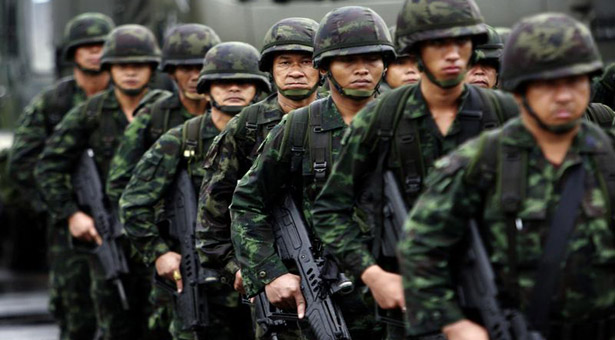Bangkok – Allies and key trading partners expressed disquiet over Thailand’s coup on Friday, demanding a quick return to civilian rule as some warned against travel to the prime tourist destination.
Japanese auto giants that have invested heavily in Thailand were forced to stop night operations at their factories to comply with a curfew imposed by the new junta, which seized power on Thursday in a move the United States said had “no justification”.
Japan, by far Thailand’s biggest foreign investor overall, described the coup as “regrettable”.
“Our country wants to call strongly for a prompt restoration of a democratic political system,” added Chief Cabinet Secretary Yoshihide Suga.
Toyota, the world’s number one carmaker which produces 670,000 cars a year in Thailand, said the curfew had halted production at all three of its local assembly plants.
Honda Motor also curtailed operations at its plant on Thursday, stopping four hours ahead of its original planned shutdown at midnight, a spokeswoman said.
The Pentagon said it was reviewing military cooperation with America’s oldest Asian ally, while Secretary of State John Kerry warned of potential fallout.
“While we value our long friendship with the Thai people, this act will have negative implications for the US-Thai relationship, especially for our relationship with the Thai military,” he said.
In Beijing, foreign ministry spokesman Hong Lei told reporters: “China and Thailand are friendly neighbours. We hope to see normal social order to be restored as soon as possible in Thailand.”
Australia meanwhile said it was “gravely concerned” at the army’s seizure of power.
“It is a volatile situation. We are monitoring it closely but people need to pay close attention to their personal security and their travel plans,” Foreign Minister Julie Bishop told ABC radio.
With Thailand drawing just over 26.7 million visitors last year, according to its tourism authority, foreign governments have largely cautioned nationals to keep their heads down without explicitly advising against travel.
However, key trade partners Malaysia and Hong Kong warned against non-essential trips after months of political turmoil escalated into the military crackdown.
Neighbouring Malaysia – Thailand’s second-highest source of visitors last year with 2.99 million tourists, behind China’s 4.7 million – advised its nationals to postpone any non-essential visits and those there to abide by the curfew.
Hong Kong raised its travel alert for Thailand to its second-highest level. The city’s Travel Industry Council said all group tours would be cancelled from May 24 to May 30, affecting 1,300 people.
Singapore also weighed in, warning that the situation was “unpredictable and volatile, and may evolve quite rapidly”.
“Singaporeans should seriously reconsider visiting Thailand at the moment,” the foreign ministry said.
Medical and travel security risk services provider SOS International also urged business travellers to defer non-essential trips, warning that all gatherings should be avoided due to a “credible risk of violence”.
Indonesia, Southeast Asia’s largest economy, said it was following developments “with deep and profound concern” and that it would seek the intervention of the Association of Southeast Asian Nations, of which Thailand is a leading member.
Asean is traditionally loath to get involved in its members’ internal affairs. But Indonesia stressed that the bloc’s charter “emphasizes adherence to democratic principles and constitutional government”, and so the coup merited engagement by the region. Source: AFP

